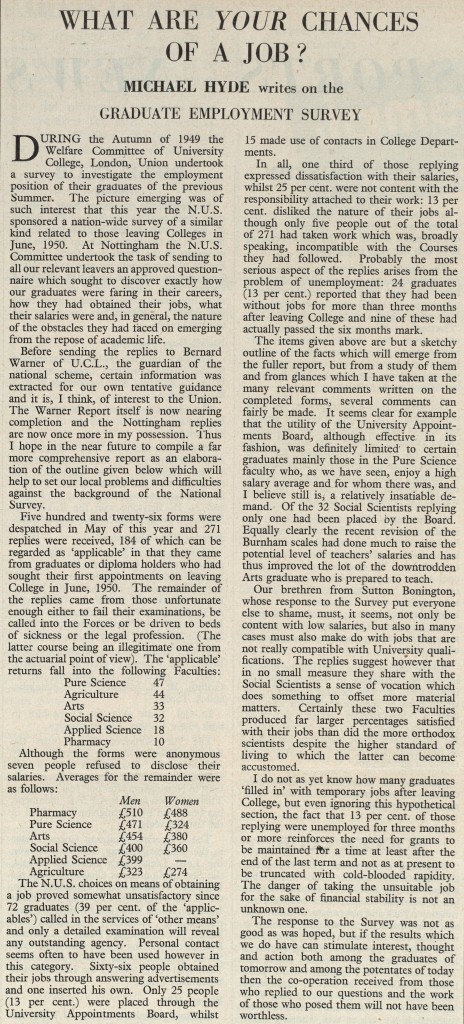
August 22, 2012, by Kathryn Steenson
What are your chances of a job?
Over the past year, Manuscripts & Special Collections has been gradually digitising our early copies of The University of Nottingham’s student newspaper ‘The Gongster’.

It makes fascinating reading, comparing student life then and now, but this article from 11th October 1951 about the woes of graduate employment particularly caught my eye, with its relevance to the current employment climate.
Sixty years ago, ‘The Gongster’ called for students’ “grants to be maintained for a time at least after the end of the last term and not as at present to be truncated with cold-blooded rapidity”, after the Graduate Employment Survey revealed 13% and 3% of Nottingham University graduates were unemployed three and six months, respectively, after graduating. The writer expressed concern that without extending maintenance grants, there was a danger that graduates who were unable to find work immediately would suffer financial hardship, or would take an “unsuitable job for the sake of financial stability”. The days of fully-funded higher education and maintenance grants for almost all students are long gone, but the fears surrounding job prospects are just as common.
The unemployment statistics quoted seem improbably small in the current economic climate. The Office for National Statistics (ONS) recently published a report titled ‘Graduates in the Labour Market – 2012’, indicating that nationally, one in five graduates was unemployed six months after graduating. In comparison, the chances of University of Nottingham’s undergraduates finding a job are much greater, as according to a survey for 2009/10 (the last year available), unemployment after six months was one in twenty.
For the majority who found work, both the ONS and ‘The Gongster’ surveys reported on the salaries commanded by graduates. As is the case today, medical and science graduates in the 1950s had greater earning potential than their agriculture and arts graduate peers, whether they were graduates of the University of Nottingham or other universities. The degree subjects have changed slightly in the last 60 years, but the trend is still very much in evidence. Few people would be surprised to note that today, nationally, graduates of Medicine or Dentistry were earning 56% more than graduates with Arts degrees. In 1951, Nottingham’s Agriculture graduates could expect to earn between 53% and 66% of the salary that Nottingham’s Pharmacy graduates earned. However, graduates with the same degree could still earn very different salaries, and the major reason for the gap between the highest and lowest paid is one that no 21st century graduate should encounter: gender.
The way that average annual earning potential in the 1951 article was divided by gender is perhaps the most obvious difference in how such information is presented today. In an age when it was taken for granted that men would earn more, the following results published in ‘The Gongster’ passed without comment:
|
Average salaries [University of Nottingham graduates]: |
Men | Women |
| Pharmacy | £510 | £488 |
| Pure Science | £471 | £324 |
| Arts | £454 | £380 |
| Social Science | £400 | £360 |
| Applied Science | £399 | – |
| Agriculture | £323 | £274 |
So what are your chances of getting a job? The report from the ONS suggests they are much better as a graduate than as a non-graduate, and statistics collected by the University support this. Regardless of the degree subject studied, graduates earn more than non-graduates. The ONS did not divide results by gender.
If you would like careers advice, please visit the University of Nottingham’s Careers and Employability Service .
Manuscripts & Special Collections has many records about life at Nottingham University, particularly in the East Midlands Special Collection and Personal Papers of staff and students, and work is being undertaken to make the University Archives more accessible.
No comments yet, fill out a comment to be the first

Leave a Reply